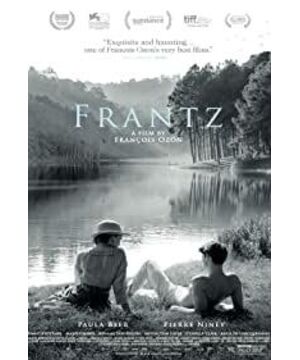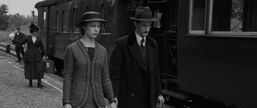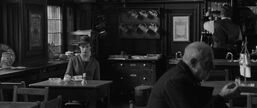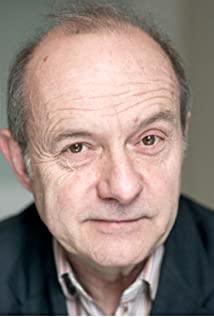FRNATZ, Gallic fabulist François Ozon's re-interpretation of Lubitsch's BROKEN LULLABY (1932), shifts its viewpoint from the guilt-driven French soldier Adrien (Niney) to the German girl Anna (Beer), who has lost her fiancé, the titular Frantz ( von Bülow) in the WWI.
Assertively redoubling his aesthetic conceit by reimagining a bygone era in divine black-and-white glamor and nostalgia, Ozon dexterously cherry-picks a few key moments (reminiscences, flights of fancy or mood upswings) and tints them with multi-color to vivify this mellow, lugubrious melodrama when events unfold in its sedate pace.
Quedlinburg, 1919, Adrien blows in the dwelling of the parents of Frantz, Dr. Hoffmeister (Stötzner) and his wife Magda (Gruber), with whom Anna lives, he fabricates the story that he and Frantz were friends in Paris to obtain admission to the mourning trio, and Ozon's genderqueer touch archly tantalizes us to suspect that he and Frantz might be lovers. Gradually, Adrien, who also plays violin like Frantz, becomes a surrogate of him, to solace his parents and fiancée through a difficult period, and naturally Anna begins to transfer her affection and tendre from Frantz to Adrien, his kindred spirit. But on the eve of his departure, Adrien comes clean to her with a bombshell, which audience has already been given plenty clues to anticipate. The truth and deceit again subject Anna into despair, but judiciously,she opts for white lies to save Frantz's parents from the ordeal.
Encouraged by Magda, a rallied Anna boards on the train to Paris, to seek Adrien out, who cannot be contacted by the address he leaves. Mirroring the antagonistic atmosphere Adrien faces in Quedlinburg, Anna's a-German-in-France situation is no less intimidating, a sagacious grace note reflects Ozon's anti-war stance, and everything is eloquently put into the mouth of Dr. Hoffmeister in his own enmity-expunging process.
Tracing the breadcrumbs (including a suicidal discovery totally guts her), Anna finally locates Adrien in his mother's estate, but the reunion is soon marred by the fact that he is going to tie the knot with Fanny (de Lencquesaing) at the behest of his mother, and Anna has a rude awakening that it is only forgiveness that Adrien wants from her, her affection is not reciprocated, during the parting of their ways, they finally share a kiss, but all Anna tastes is gratitude laced with a ghost of indetermination . However, her journey of finding out the truth is not at all a detrimental force, through which Anna owns her independence, and eventually her transference period will pass, as she sits in front of Manet's LE SUICIDÉ in the coda, rendered with its full color, it gives her courage to live, that perfectly recaps Ozon's belief,in a world where truth is mingled with lies, imagination obfuscates reality, Anna's rite-of-passage out of a gloomy past is a resounding encomium of a human's inner strength.
A namby-pamby Pierre Niney engages us with a pluperfect air of ambivalence that sometimes is too painful to behold, and a 20-year-old Paula Beer quietly stuns us as an emergent bilingual leading lady, incredibly evokes a low-key but bewitching sophistication that is far beyond her tender age and can surely enthuse discernible spectators and casting directors. A corker in Ozon's tracking record, FRANTZ is a modern reiteration that holds itself against its ancient predecessor.
referential entries: Ozon's DOUBLE LOVER (2017, 6.7/10), UNDER THE SUN (2000, 7.2/10), Michael Haneke's THE WHITE RIBBON (2009, 8.0/10).
View more about Frantz reviews











